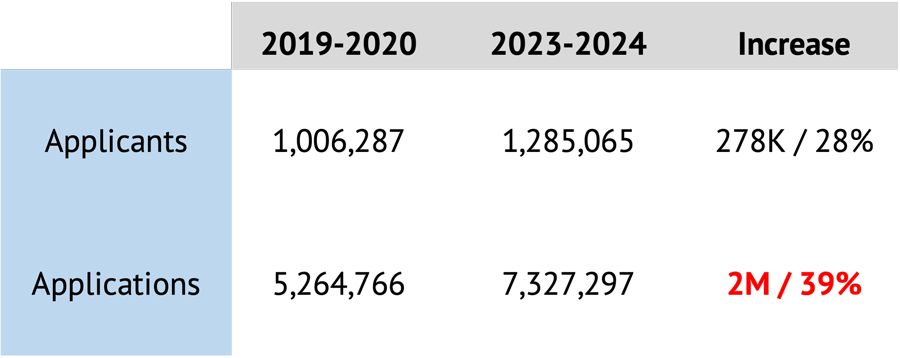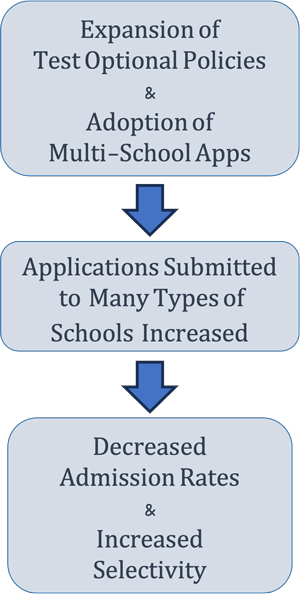|
Since 2020, the percentage of high school seniors submitting admissions test scores from the ACT or SAT as part of their college applications has dropped to just under 50% in 2023 as most schools adopted “test-optional” policies. While test optional policies have empowered students to control more of their own destiny, they have also created a confusing landscape where families struggle to understand what “test optional” really means within the context of each school. While some schools embraced the new position, many just used the label and continued to prioritize applicants with scores, but few were transparent about their exact position or what they really wanted. Source: Common App - Deadline updates, 2023–2024: First-year application trends through Feb 1, 2/14/24
Probably a Good IdeaYes, we recommend every student have at least one set of test scores (ACT or SAT – which one does not matter to the colleges) that they can use when needed to during their applications. You may never have to use them, but we find that for most students submitting their scores is beneficial, and if you discover late in the process that you need them, you will be thankful you took the test. Many schools also continue to provide merit aid and scholarships based in part on a student’s test scores, so not having admissions test scores could be financially costly too. The New MessageSchools that have recently ended test optional policies after piloting them for several years have examined the evidence and concluded that college admissions test scores predict first-year college success and help them evaluate a student in context of their socio-economic background. So while a student’s score may seem low in the larger band of what the college admits, for that student and their background, the score signals to the college that the student is ready and able to succeed at their school if given the chance. Schools also understand that grade inflation is occurring nationally for a variety of reasons and to a varying degree. Consequently, a student’s GPA is now a less-reliable indicator for a student’s potential success in college without other validation like SAT, ACT, IB, and AP exams. It also becomes impossible to quantitatively rank applicants effectively when so many have grade point averages in a narrow band at the top of the 4.0 scale. You can only differentiate so much between similar GPAs. Schools most often would like you to send a score even if you think it is outside their parameters because it offers them an independent evaluation of a student’s readiness and can often validate what they believe will be a good candidate, even if the student has a few detractions. Many colleges look to understand the context of where a student went to school and evaluating GPA and test scores is based on those other signals. They also realize that in a test-optional situation, they are losing many applicants on the bubble who choose not to submit a score that would have otherwise helped them stand out based on the student’s background. College admissions offices are also very reliant on data, so schools like to be able to track and evaluate who they admit and how they perform long-term, and test scores have traditionally been an important component of that process. Class of 2025: It’s the Wild West Right NowAs members of the high school Class of 2025 are starting to seriously consider their college lists, they face a myriad of possible testing requirements, both implicit and now explicit, as schools further fracture into new test requirement paradigms. With announcements coming regularly now, many colleges have indicated that they will be reinstating test requirements, while others are expanding options. Expect many more schools and state systems to announce their intentions for the Classes of 2025 and 2026 during the spring. With so many variations, it is important that applicants have a solidified college list sooner than later and that they check and monitor each of their school’s requirements for changes ahead of the start of application season in August. Recent Changes in Admissions Test PoliciesUpdated April 15, 2024 Here are some recent changes in test-optional policies at several Ivy League colleges: DartmouthFor the school’s Class of 2029, Dartmouth will require either an ACT or SAT score, and the results from multiple tests will be superscored if submitted. In their February 5, 2024 announcement, the school said: “New research confirms that standardized testing—when assessed using the local norms at a student's high school—is a valuable element of Dartmouth's undergraduate application, and high school grades paired with standardized testing are the most reliable indicators for success in Dartmouth's course of study.“ “A score that falls below our class mean but several hundred points above the mean at the student's school is "high" and, as such, it has value…in our holistic assessment. That is how we consider testing at Dartmouth, and the opportunity to imagine better ways to inform students about their "score strength" will be a priority for us.” “[W]e believe a standardized testing requirement will improve—not detract from—our ability to bring the most promising and diverse students to our campus.” YaleYale announced on February 22, 2024, that it will implement a “test flexible” policy for students applying for admission in the Fall of 2025. “Test flexible” means that students must submit a national test score, but they can choose to submit a score from an ACT, SAT, AP, or IB exam, which broadens the possibilities for many students. Here are some key highlights of their new policy:
You can read more about the reasons for the change in policy here and here. BrownBrown University announced on March 5, 2024, that it would reinstate a test requirement for the school’s Class of 2029, with either the ACT or SAT score required. Some highlights of their announcement:
HarvardAfter previously indicating that applicants for the Class of 2029 would be test-optional, Harvard announced on April 11, 2024 that it would be requiring ACT or SAT scores from applicants for that class this fall. Applicants who cannot access either of those tests can also submit AP or IB exam scores instead. According to Harvard’s Dean of the Faculty of Arts and Sciences Hopi Hoekstra, “Standardized tests are a means for all students, regardless of their background and life experience, to provide information that is predictive of success in college and beyond…more information, especially such strongly predictive information, is valuable for identifying talent from across the socioeconomic range.” CaltechCaltech also announced its return to test-required on April 11, 2024, citing many of the same reasons as the prior schools. Students applying for the Class of 2029 this fall will need to submit an ACT or SAT score. In its announcement, the school highlighted its science-focused mission, saying, “In reinstating the standardized testing requirement, Caltech reaffirms its commitment as a community of scientists and engineers to using all relevant data in its decision-making processes.” Even though Caltech had not considered test scores since 2020, their analysis found that 95% of their most recent class had in fact taken a test and could have submitted scores if required. State Universities Are Considering Lots of OptionsBeyond the changes mentioned above at Ivy League schools, several state schools have or are considering major changes in their testing policies. Currently many state schools in Florida, Georgia, and Tennessee require the submission of test scores, and more are likely to join them or expand current policies. University of Texas at AustinIn their March 11, 2024 announcement, the University of Texas at Austin confirmed the reinstatement of testing requirements for students beginning in the 2024-2025 application cycle. Some highlights of the announcement:
North CarolinaThe University of North Carolina system, which includes UNC-Chapel Hill and NC State among others, is looking at reinstating test score requirements for applicants who have a GPA below a certain threshold. Individual schools would also have the discretion to require test scores for applicants who had higher GPAs or for every applicant. A final vote on the new policy is expected in April. According to local press reports, some highlights of the current proposal include:
GeorgiaPresently, University of Georgia, Georgia Tech, and Georgia College & State University require scores be submitted. The board of the Georgia state university system is now considering bringing back testing requirements to all the state universities. According to local news reports, the changes are being considered for implementation next year because there is a concern that teachers and administrators are inflating grades to qualify students for the Georgia Lottery-funded HOPE Scholarship, which requires a 3.0 grade-point average. The board is monitoring the actions in other states like Tennessee and North Carolina as they consider their next steps. MichiganOne major change in the opposite direction is the University of Michigan. The school had previously allowed students to use AP exams as “test score” submissions, but it announced in March that it will now switch to test-optional and only ACT and SAT scores will be considered as a test submission. Bottom Line: Check Back Often and Don’t Be Afraid to AskStudents need to have a firm understanding of each school’s policy, which means they need to work on identifying schools for their college list earlier than in prior years. Students can also get information about how much a school values test scores and what test scores have been for admitted students through each school’s Common Data Set, which you can search for on the school’s website. In sections C of the CDS will be a tables with information on priorities for admissions and the test scores of the students who enrolled for the school’s most recent freshman class. Also consider that many schools now push lower-scoring students into non-fall admissions times in order to dis-include their test scores from the data that goes into the CDS and the third-party ranking lists. So often the score necessary to do well at a school, and for which they will admit a student, is lower than the data in the CDS would indicate. If in doubt, ask an admissions counselor at the school how closely they adhere to the CDS numbers or if they admit a wider range. You will probably be glad you did. How Should Students Prepare Now?Students should start by trying both a practice ACT and a practice SAT to see which test they are best prepared to utilize. Then plan out if they have time to take multiple sittings of their chosen test, since most schools allow super scoring across test dates (again something to check with the admissions rep!). We recommend planning for two test dates as close together as possible so you do not lose the skills and knowledge learned while prepping.
For rising seniors, the last tests you can really take for your early decision or early action applications, which are typically November 1, are the September ACT and October SAT, although later dates will work for regular decision and rolling applications. With the announcements from Michigan and from Yale, students should also consider how their Advanced Placement courses and exams can support their applications, as these may play a more prominent role in future admissions cycles. We always advise students to focus first on scoring their best in the AP course and then to focus on doing well on the AP exam, since colleges will always see your grade in the class, but might not see the exam score unless you submit it for consideration. Ready to consider preparing for a college admissions test? Learn more about our test prep process and then sign up for our diagnostic testing.
0 Comments
Leave a Reply. |
AuthorAnn Derryberry Archives
March 2024
Categories
All
|
Telephone |
© 2024 Everest Tutors & Test Prep | All Rights Reserved




 RSS Feed
RSS Feed